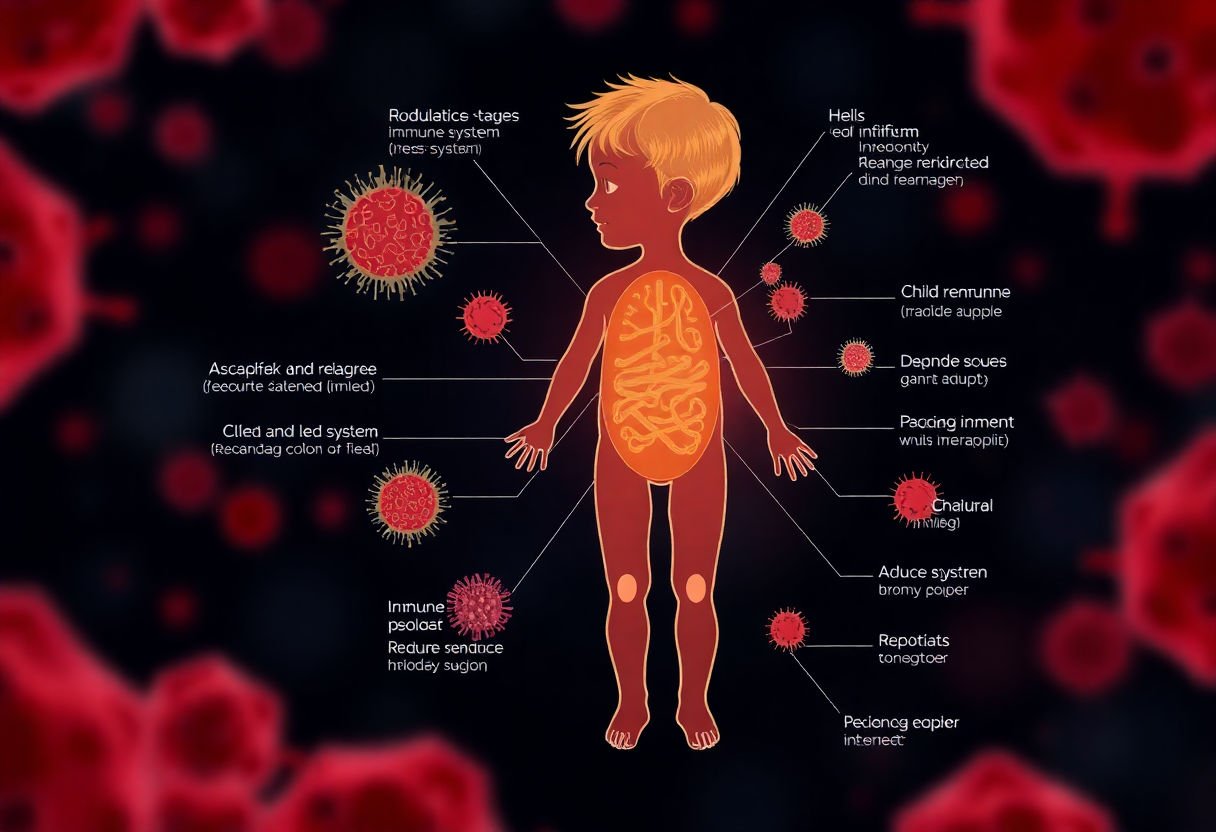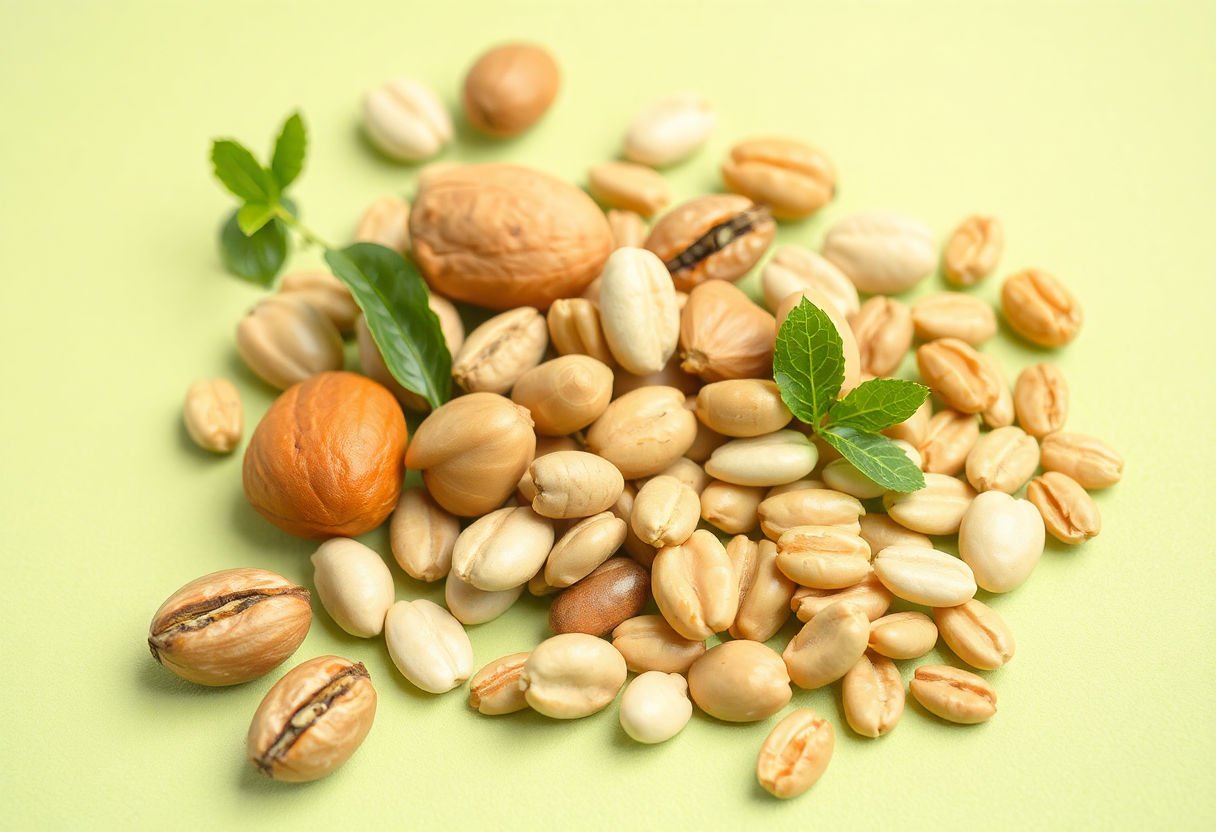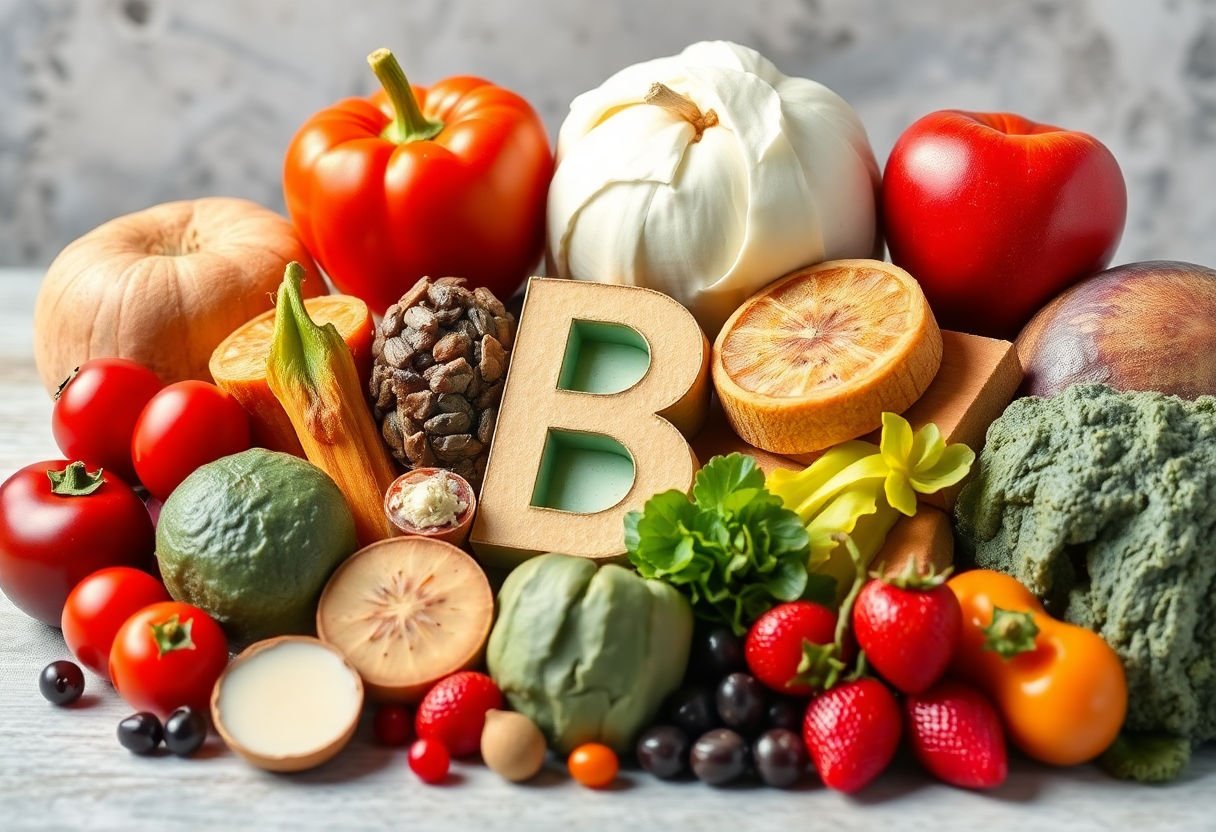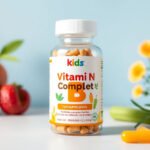Discovering the best ways to protect your child’s health is a journey many parents undertake. In the quest for optimal wellness, understanding the role of essential vitamins becomes crucial. These nutrients are not just vital for growth, but they are also pivotal in boosting the immune system. This article delves into the specific vitamins that enhance immunity, including Vitamin C, D, and E, alongside vital minerals like Zinc and Iron. By unveiling their benefits and natural sources, we aim to empower you to make informed decisions about your child’s dietary needs, ensuring their future health is as robust as possible.
Key Takeaways
- Essential vitamins, such as Vitamin C, D, E, and B Complex, play a crucial role in strengthening your child’s immune system.
- Incorporating foods rich in Zinc and Iron can significantly improve your child’s immunity, protecting them from various illnesses.
- A balanced diet that includes a variety of vitamin-rich foods can enhance immune function and overall health in children.
- Ensuring adequate intake of these vital nutrients in childhood fosters long-term health benefits and disease resistance.
Understanding the Immune System

The immune system in children is a complex network of cells, tissues, and organs that collaborate to defend against harmful pathogens like bacteria, viruses, and parasites. It’s responsible for recognizing and neutralizing these foreign invaders, ensuring both immediate and long-term protection.
Key components of the immune system include:
- White blood cells or leukocytes, which are the mainstay of the immune response.
- Lymphoid organs, such as the thymus, bone marrow, and spleen, which produce and house immune cells.
- Antibodies, specialized proteins that identify and neutralize antigens.
In children, the immune system undergoes continuous development. This process is vital as it equips them with the ability to fend off infections more effectively as they grow. Proper nutrition is crucial during this phase, and an adequate intake of essential vitamins can significantly enhance immune function.
Vitamins play a pivotal role in supporting the immune system’s performance:
- Vitamin C contributes to the production of white blood cells and enhances their function.
- Vitamin D modulates the immune response and reduces inflammation.
- Zinc supports the development and function of immune cells, acting as a powerful antioxidant.
Ensuring children receive a well-balanced diet rich in these nutrients helps strengthen their immune responses, thus reducing the risk of infections and promoting better health outcomes. Understanding the intricate workings of the immune system allows for informed dietary choices that foster a resilient immune defense in children.
Vitamin C: A Powerhouse for Immunity

Vitamin C is renowned for its crucial role in supporting immune health, especially in children, whose immune systems are still developing. This essential nutrient is a formidable defender against infections and illnesses, working tirelessly to strengthen the body’s natural defenses.
One of the primary benefits of Vitamin C is its ability to enhance the production of white blood cells, which are vital for fighting off pathogens. Moreover, Vitamin C acts as a powerful antioxidant, shielding cells from damage caused by harmful molecules known as free radicals. This protective feature helps maintain the integrity of the immune system, ensuring that it operates at peak performance.
Children who receive adequate amounts of Vitamin C are likely to experience fewer colds and recover faster from common illnesses. This nutrient also supports the skin’s barrier function, which serves as the first line of defense against external invaders.
Including Vitamin C in your child’s diet can be achieved through a variety of natural sources. Citrus fruits such as oranges, lemons, and grapefruits are well-known providers of this vitamin. However, other fruits and vegetables like strawberries, kiwi, papayas, and broccoli also boast significant quantities of Vitamin C.
It’s important to note the recommended dietary allowance for children varies with age, ensuring they receive just the right amount to bolster their immune function without exceeding safe limits. By incorporating a diverse range of these foods into their meals, parents can help nurture a robust immune system capable of fending off diseases effectively.
The Role of Vitamin D in Immune Health

Vitamin D, often referred to as the “sunshine vitamin,” plays an indispensable role in supporting the immune system, particularly in children. Its influence on immune health is profound, as it not only aids in the regulation and enhancement of the immune response but also serves as a frontline defender against infections.
The immune system consists of various components, among which T-cells and macrophages are crucial. Vitamin D enhances the pathogen-fighting effects of these cells, helping in the effective mitigation of infections. Studies indicate that adequate levels of Vitamin D can influence the production of antimicrobial peptides, which are part of the body’s natural defense mechanism against pathogens.
For children, ensuring sufficient Vitamin D intake is paramount. The primary natural source of this vitamin is sunlight; however, geographical location, lifestyle, and skin pigmentation can affect synthesis. To guarantee that children receive an optimal amount of Vitamin D, dietary sources become vital. These include:
- Fatty fish such as salmon and mackerel
- Fortified foods like milk, orange juice, and cereals
- Egg yolks
It is often necessary to consider supplements, especially in cases where sunlight exposure is limited. According to the American Academy of Pediatrics, children above the age of one should receive at least 600 IU of Vitamin D daily, although specific needs may vary and should be discussed with a healthcare provider.
In summary, the strategic intake of Vitamin D is essential for enhancing children’s immune health, supporting their bodies in warding off illnesses more effectively.
Zinc: A Trace Mineral with Major Benefits
Zinc, a trace mineral required in minute amounts, plays a pivotal role in bolstering your child’s immune system. Despite its necessity in small quantities, its impact on health is substantial. It is involved in various immune functions, including the development and function of immune cells such as neutrophils and lymphocytes. By enhancing these cells, zinc aids in reducing the duration and severity of illnesses, making it an essential component of a child’s diet.
A deficiency in zinc can lead to a weakened immune response, making children more susceptible to infections. Thus, ensuring an adequate intake of zinc is crucial for maintaining a robust and responsive immune system. Children require approximately 3 to 8 milligrams of zinc per day, depending on their age and sex.
To incorporate zinc in your child’s diet, focus on rich dietary sources:
- Meat and Poultry: Ground beef, chicken breast, and pork chops.
- Seafood: Oysters, crab, and lobster.
- Legumes: Chickpeas, lentils, and beans.
- Nuts and Seeds: Pumpkin seeds, cashews, and almonds.
- Dairy Products: Cheese and yogurt.
- Whole Grains: Quinoa and fortified breakfast cereals.
These foods not only provide zinc but also other essential nutrients that further support overall health. By integrating diverse zinc-rich foods into meals, you ensure your child gains the myriad benefits this trace mineral offers in strengthening immunity and promoting healthy growth and development.
Iron: Strengthening the Immune System
Iron is a crucial nutrient that plays a significant role in fortifying your child’s immune system. It is essential for the production of hemoglobin, a protein in red blood cells responsible for transporting oxygen throughout the body, which directly influences immune health.
For children, iron supports the development of immune cells that are vital for detecting and combating pathogens. A deficiency in iron can lead to anemia, which weakens the immune response, making your child more susceptible to infections. By ensuring adequate iron intake, you help optimize immune function and overall health.
Incorporating Iron-Rich Foods
Including iron-rich foods in your child’s diet is an effective way to enhance their immune system:
- Red meat: Beef, lamb, and pork are excellent sources of heme iron, which is more easily absorbed by the body.
- Poultry and fish: Chicken, turkey, and oily fish also provide a good amount of heme iron.
- Legumes: Beans, lentils, and chickpeas offer non-heme iron, which is particularly beneficial for plant-based diets.
- Green leafy vegetables: Spinach and kale are notable for their iron content, though pairing them with vitamin C-rich foods can improve absorption.
- Fortified cereals: Many breakfast cereals are enriched with iron and can be a convenient breakfast option.
Parents should monitor iron intake to avoid the risk of iron overload. Consult a healthcare provider if you have concerns about your child’s iron levels; they can recommend dietary adjustments or supplements if necessary. Overall, maintaining balanced nutrition ensures that your child receives the iron necessary for a robust immune system.
The Benefits of Vitamin E for Immunity

Vitamin E stands as a vital nutrient when considering the fortification of a child’s immune system. Its primary role is as a potent antioxidant, crucial for the protection of immune cells from oxidative stress and potential damage. This antioxidant property is essential as oxidative stress can weaken immune responses, potentially making children more susceptible to infections.
A well-functioning immune system relies on the health and vitality of its cells. Vitamin E contributes significantly by maintaining the integrity and strength of these cells. It supports the production of T-cells, a type of white blood cell that plays a critical role in the immune response by targeting and eliminating pathogens.
Dietary sources of Vitamin E include:
- Nuts and Seeds: Almonds, peanuts, and sunflower seeds are rich in Vitamin E.
- Vegetable Oils: Oils such as sunflower, safflower, and wheat germ oil are excellent sources.
- Leafy Greens: Spinach and broccoli offer a good portion of this vital vitamin.
- Fortified Foods: Many cereals and juices are fortified with Vitamin E, providing an easy dietary option.
By incorporating these foods into your child’s diet, you can help ensure an adequate intake of Vitamin E, thus bolstering their immunity. It’s important to integrate a variety of these foods, as a balanced approach maximizes both nutrient intake and overall health benefits.
In conclusion, by delivering essential protection to immune cells, Vitamin E not only supports immediate health but also contributes to a robust foundation for your child’s long-term immune resilience.
Managing Vitamin B Complex for Immune Support

Vitamin B Complex is critical in fortifying your child’s immune system. Comprised of eight distinct vitamins, each plays a unique role in maintaining immune health. Understanding their individual contributions can help in better managing your child’s intake for optimal immune support.
-
Vitamin B1 (Thiamine): Vital for energy metabolism, Thiamine aids in cell formation, which is essential for optimal immune function. Include whole grains and legumes in your child’s diet to ensure they receive enough.
-
Vitamin B2 (Riboflavin): This vitamin supports the production of antibodies, enhancing the body’s defense mechanisms. Dairy products and eggs are excellent sources.
-
Vitamin B3 (Niacin): Niacin assists in maintaining healthy skin and mucous membranes, crucial barriers against pathogens. Moderate amounts can be found in meat and fish.
-
Vitamin B5 (Pantothenic Acid): Known for helping to reduce inflammation, B5 is integral to a healthy immune response. It’s abundant in chicken, beef, and whole grains.
-
Vitamin B6 (Pyridoxine): Essential for the production of hemoglobin and neurotransmitters, which play a part in immune regulation. Rich sources include bananas, chickpeas, and potatoes.
-
Vitamin B7 (Biotin): Important for maintaining a balanced immune function, Biotin can be sourced from nuts and seeds.
-
Vitamin B9 (Folate): Critical for DNA synthesis and repair, Folate supports the development of new immune cells. Leafy greens and citrus fruits provide a good amount.
-
Vitamin B12 (Cobalamin): This vitamin promotes the production of white blood cells crucial for fighting infections. It is naturally found in animal products, such as meat and dairy.
Balancing a variety of these B vitamins ensures a robust support system for your child’s immune resilience.
Conclusion
In conclusion, equipping your child with a robust immune system begins with providing a balanced diet rich in essential vitamins. From the immunity powerhouse of Vitamin C to the fundamental roles of Vitamin D and Zinc, each vitamin contributes uniquely to a child’s health. As children’s dietary needs evolve, ensuring a well-rounded intake of these key nutrients will help sustain their growth and immune strength. Encourage a diet that includes diverse sources of these vitamins, fostering both immediate health benefits and long-lasting resilience.
Frequently Asked Questions
What are the most essential vitamins for boosting my child’s immunity?
The most essential vitamins for enhancing your child’s immune system include Vitamin C, Vitamin D, Zinc, Iron, and Vitamin E. Each plays a unique role in supporting and maintaining immune health.
How can I ensure my child gets enough of these vitamins?
To ensure adequate intake, incorporate a variety of fruits, vegetables, lean proteins, and whole grains into your child’s diet. If necessary, a pediatrician may recommend supplements to fill any nutritional gaps.
Can a balanced diet provide all the necessary vitamins for optimal immunity?
Yes, a balanced diet rich in diverse foods can generally supply all the essential vitamins needed for robust immunity. However, specific dietary needs can vary, so consulting with a healthcare provider is advisable for personalized guidance.
Are vitamin supplements safe for children, and when should they be considered?
Vitamin supplements can be safe for children when used as directed and prescribed by a healthcare professional. They are considered when dietary intake alone does not meet nutritional requirements.
How can I tell if my child is deficient in any essential vitamins?
Signs of vitamin deficiency can include fatigue, frequent illness, or slow recovery from infections. If you notice these symptoms, it is important to consult a healthcare provider for proper assessment and advice.


